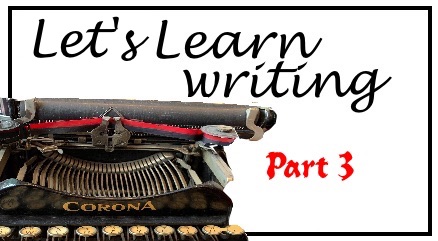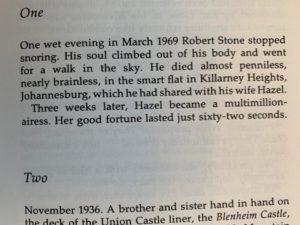
TIPS FOR NEW WRITERS Part 3: one response
SECRETS, LIES AND SURPRISE!
And AIDA!….
What are the basics of a good joke?
Start with the ordinary. Then surprise! And people laugh because the unexpected snuck up on them like a sudden feather up the nose.
Here are some of the worst jokes on the internet: http://justsomething.co/18-of-the-funniest-jokes-ever-10-is-gold/
Almost every one of them relies on wordplay. An unexpected rendering of a well-known word or phrase. In other words, a dad joke. Or a dud joke. See? I just made one! But in writing fiction, bad wordplay is horrible. Avoid! But good mind play makes all the difference.
It’s easy being ordinary. Extraordinary requires balls. Especially if you’re a woman.
(Is that bad wordplay? Or just put there to annoy and shock? Do not misinterpret the above. I’m not going into why the last paragraph is not sexist. It just isn’t.)
Extraordinary means avoiding cliche of course – in my previous tutorial I explained how you can demolish the components of a cliche to create better images. In this article I am going to concentrate on the hunt for refreshment – waking up language to surprise and delight the reader with the deliciously different.
The best place to hit them with the unexpected is obviously the first line of a story or novel. It took me ages to come up with killer first lines, long after the novel was completed. I am happy with my openers of my first two. Umfaan’s Heroes’ : “ Hallo. My name is Thomas Bloch. I am lying on a bed in a military hospital. This is 1967. The body I am wearing is full of holes, dents, cuts and bruises….”
Full of surprises and mysteries. The reader’s question is “why?” What does he mean by “the body I am wearing”? And so the reader’s duty is to find out. Hence, read on.
In Laszlo’s Millions, I used a whole paragraph to get the reader to invest in the story.

So like a good joke, I end the paragraph with a surprise, that is also a teaser. Then, sudden surprising backstory.
The great secret of good advertising – and getting a potential reader to buy your book – is also the name of a grand opera: AIDA. An acronym, of course.
Attention- get it with jacket design, blurbs, reviews, title.
Interest: arouse interest with your first lines
Desire: make the reader want to know what comes next. With a teaser or a great character or an amazing event.
Action: read on! Read to the end!
So you, dear writer, had better earn the honour of a reader reading your whole damn book and loving it.
Sing! Skip Ad! Skip Ad! https://www.youtube.com/watch?v=l3w4I-KElxQ
My novel in production (which may be called ‘Ragazzo’ or ‘Castrato’ or possibly, ‘Opera’, whichever delights me more) begins with “ “ (Not telling you yet. That first paragraph is still being crafted.)
However good the first line, if the rest’s crap, you have created a mere fart. Your mum or boy/girlfriend will notice it for a bit, snarl, blame you for polluting the family name, and then forget it ever happened. All it will ever leave behind is the trace of a sneer.
So what is the difference between farting and a good shit?
CANCEL THE ABOVE!
A perfect example of a writer striving so hard for originality, he reverts to shock. Toilet images. Boo.
Surprise! Watch Killing Eve Season 2 Episode 1. The scenes are like small islands in a bloody sea which the viewer visits in sequence. Attached to each island are sweet seconds of surprise: In a mortuary, with a gruesome body in the foreground, Eve suddenly says “I want a hamburger” to which the response (I think it was Carolyn) is, “It’s the formalin. It makes you crave meat.” So they order burgers and eat them while discussing the cause of death. The burgers have no relevance to the plot whatsoever.
There are many more, this episode is the perfect example of what I mean.
As to writers, Kurt Vonnegut is a master of this technique.
Exercise: watch an episode of a successful Netflix or Amazon series. Choose something more or less in the Black Humour genre. Black Mirror is perfect. OR Killing Eve, of course. Identify an island, and explain how SURPRISE is used.
Afterthoughts:
- Do not overuse surprise or it’s no longer surprising.
- Avoid dad jokes
- Be playful! But never cause teeth to grind.
- Be aware of GENRE, tone, pace and style. Getting this right is critical.
The scriptwriter I’m working with on a series says, “Every scene must have conflict in it.” NEXT TIME: How to use CONFLICT and contrast.
KEEP WRITING! Remember, I am happy to read your exercises and make comments, either use the comment thread below or email me at jonelkon3@gmail.com.
p.s: Secret exercise: There is evidence that I don’t always follow my own rules in the article above. Can you find it?
I love how you applied AIDA to grabbing a reader’s attention and selling a book.
I need watching Killing Eve season two! But before that, I must watch season one.